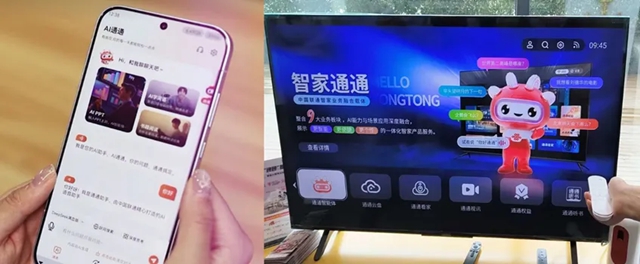
China Unicom and Huawei have partnered to develop the AI Service Function (AISF) to enhance AI accessibility. Built on the AISF, China Unicom's AI assistant is intended to reduce the complication of consumer apps, apply personalized settings consistently across multiple consumer devices, and provide voice-command features for various convenience services such as online shopping or travel booking services. This AI assistant will help bridge the digital divide and make AI more accessible to more populations.
Digital inequality is a common concern in many regions, and these divides are widening as AI adoption increases. While an increasing number of high-end mobile phones and TVs come with built-in AI assistants, most devices still do not. Even devices equipped with AI assistants still face limitations in comprehension and execution. At the same time, consumer apps are continuing to grow in number and complexity. All these challenges make digital access difficult for many vulnerable populations including senior citizens and children.
China Unicom's AI assistant is intended to help tackle these challenges. It enables multi-device coordination in convenience and lifestyle scenarios, which helps users more easily interact with emerging technologies in their daily lives. This AI assistant is powered by three main technological breakthroughs:
High-speed interactions with millisecond-level response: Using an innovative fast-slow path intent recognition solution, China Unicom's AI assistant achieves a significant leap in intent recognition accuracy, which allows it to deliver an industry-leading understanding of complex commands. This helps the AI assistant better understand and more quickly respond to user requests, like booking a health check-up or planning a commute using a single voice command.
Seamless personalized assistance across devices: China Unicom's AI assistant uses a multi-device memory fusion technology that allows user preferences to be shared between mobile phones, TVs, and other devices. Examples of how this technology increases service adaptation include the ability to automatically open a purchase order on a mobile shopping app using a voice command after seeing an advertisement on TV, and automatically coordinating navigation and ride-hailing apps after just saying "Get ready to go to the office".
Multi-app accessibility through autonomous operations: China Unicom's AI assistant leads the industry in successfully completing complex tasks involving more than 20 steps—something which can be critical for many traditionally underserved user groups. For example, users with disabilities can use the natural language interface to book cleaning services or complete business transactions. When purchasing appliances, this means the entire process from price comparison to order placement and installation scheduling can be completed without manual intervention.
The AISF, the digital foundation of China Unicom's AI assistant, additionally comes with enhanced safety and trust features, given the increased risks associated with many AI services. It uses multiple layers of security safeguards, including identity protection, model protection, data protection, and more, all while ensuring full traceability across operations. This comprehensive approach protects user privacy and information security. In addition, advanced content-filtering mechanisms help ensure that AI-generated outputs remain compliant and appropriate.
Since its commercial launch in March 2025, China Unicom's AI assistant has served more than 13 million cloud phone and 2 million families users. Early adoption has been accompanied by steadily increasing satisfaction and recommendation rates. By integrating software and hardware optimization, this AI assistant has also reduced compute costs and improved operational efficiency, creating a strong foundation for large-scale expansion.
China Unicom's AI assistant distinguishes itself from comparable products with its seamless cross-device interoperability, unique digital identity mechanism that links SIM cards and phone numbers, and a high success rate in autonomous app operations. Its open architecture that flexibly integrates global large models has helped reinforce its technological leadership. Looking ahead, the ecosystem is set to expand into new devices such as smartwatches and intelligent cockpits. China Unicom's current goal for this AI assistant is to reach 100 million mobile phone users and 10 million households within the next three years, potentially covering 250 million people.
This collaboration between China Unicom and Huawei is part of the two companies' shared vision of making AI accessible to all, removing barriers between devices, and empowering user groups that have traditionally been underserved by technology.

